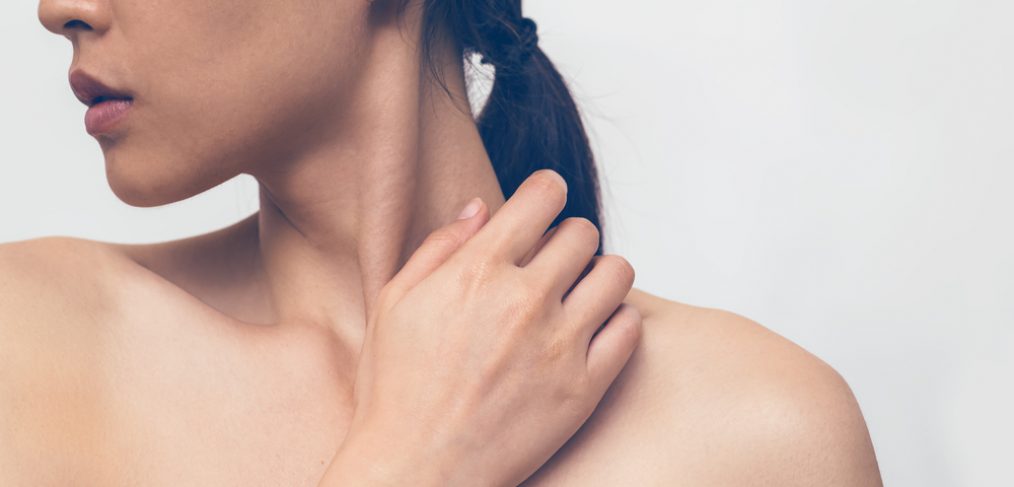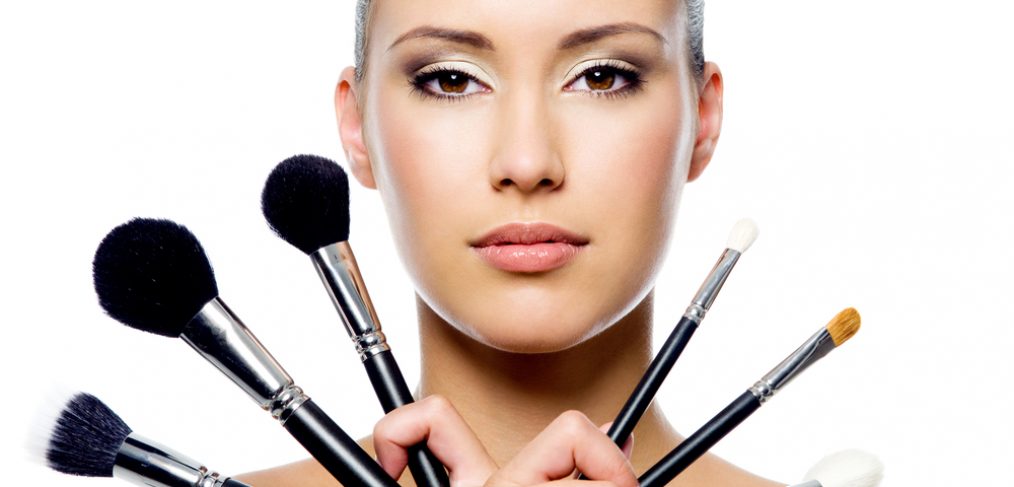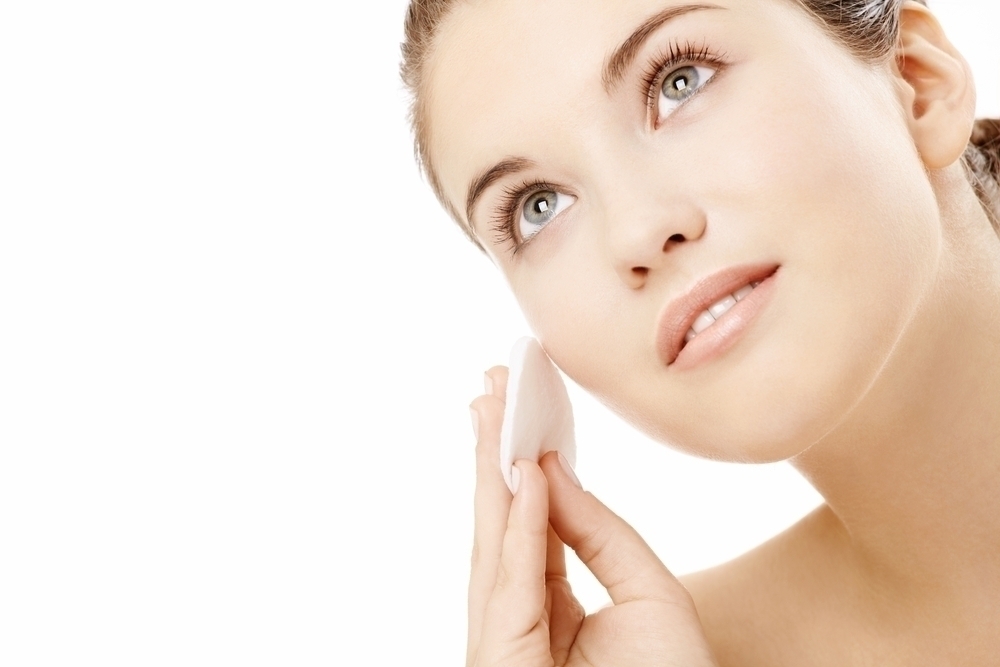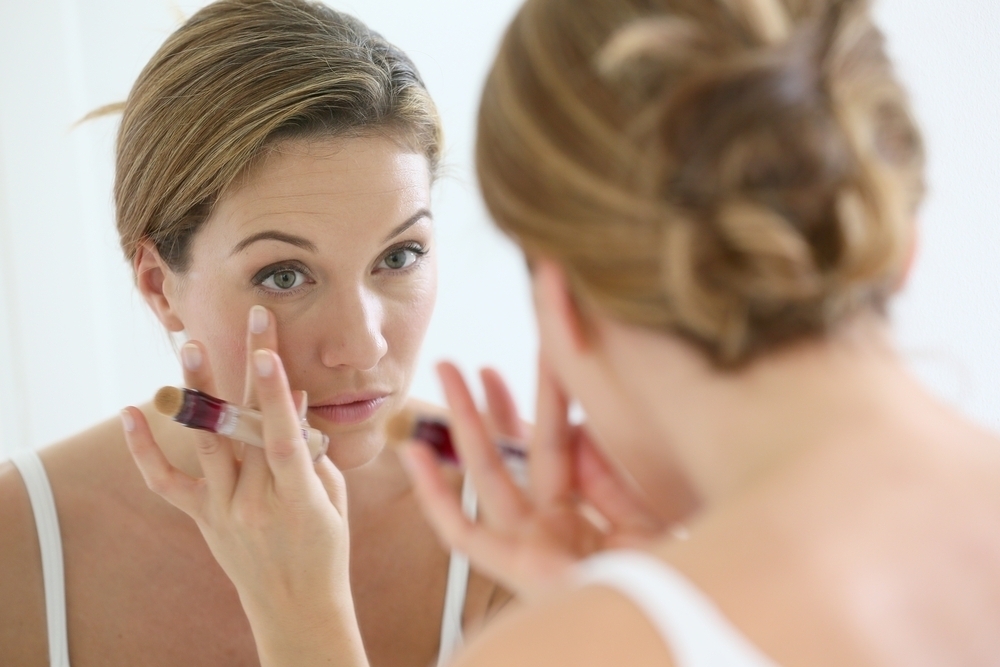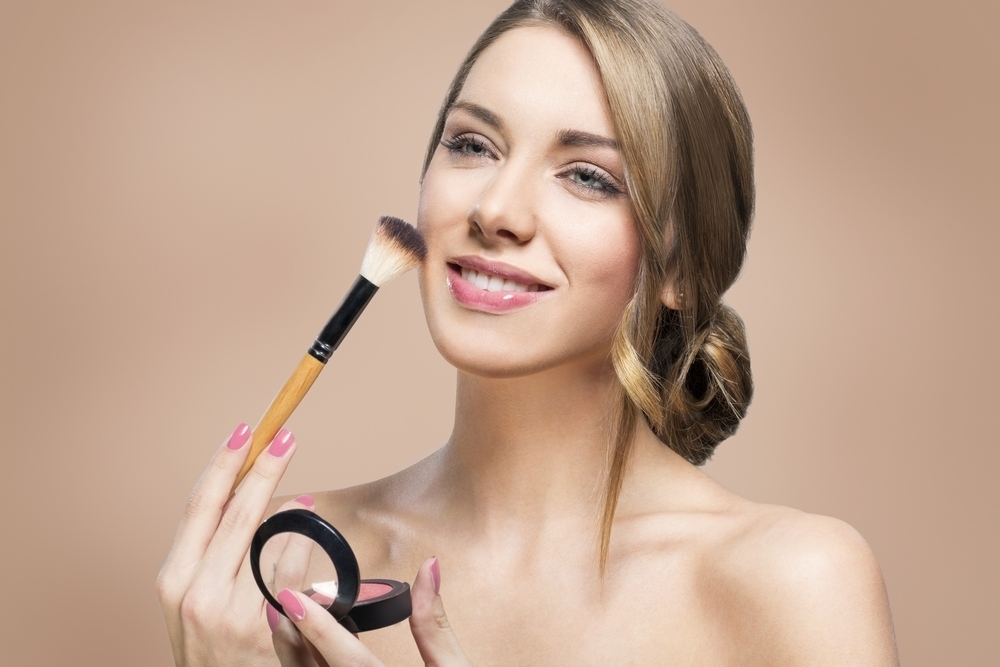It is so easy to fall into a beauty rut, using the same cosmetic products decade after decade. However, your skin, as well as your features, change as you age, meaning that your makeup products and application techniques need to evolve too.
From foundation to lipstick, here are some guidelines when it comes to makeup for mature skin.
Start With Your Skin
The best-looking makeup begins with good skin, which is why this should always be your initial focus when evaluating cosmetics.
Before applying any makeup to your face, you need to ensure that your skin has been thoroughly cleansed. Exfoliating it will be a bonus, as this will clear away any dead skin cells and rough patches from the surface of your skin, giving you a blank canvas to work with when it comes to your makeup.
Immediately after exfoliating, you need to moisturize your skin.
This is even more important for mature skin…
Why?
Because one of the main skin issues that mature skin faces is a lack of moisture, as skin loses its ability to retain moisture as it ages. This can result in a rough and dry complexion, which will only end up being accentuated, rather than hidden, by your makeup.
A thick and rich moisturizer is best, and it should also contain plenty of antioxidants, such as vitamin C and resveratrol.
Another bonus to moisturizing before applying any makeup?
It will give your face a smooth and dewy finish, meaning that your makeup will just glide effortlessly on afterwards.
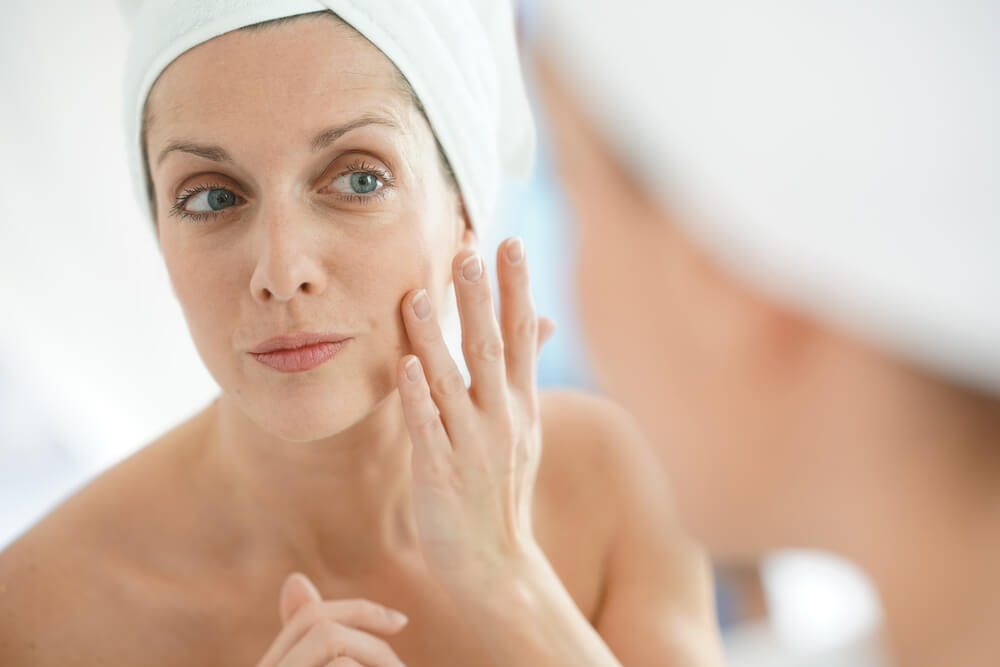
Primer
Primers are not strictly essential, but do have quite a few benefits, especially when it comes to mature skin.
Here are a few of the reasons as to why you should be using a primer:
- Hides visible pores
- Smooths and softens the skin
- Gives makeup a base to grip on to, meaning it lasts for longer
- Prevents foundation from oxidizing and changing color
When choosing a primer for mature skin, you want the formula to be a lightweight and moisturizing one, without containing any shimmer. As with any product you use, try to pick one that contains added antioxidants. If your skin is sensitive, look for a primer that contains soothing ingredients, such as niacinimide or green tea.
Foundation
When it comes to choosing a foundation for mature skin, thick formulas, or loose powders, are a big no.
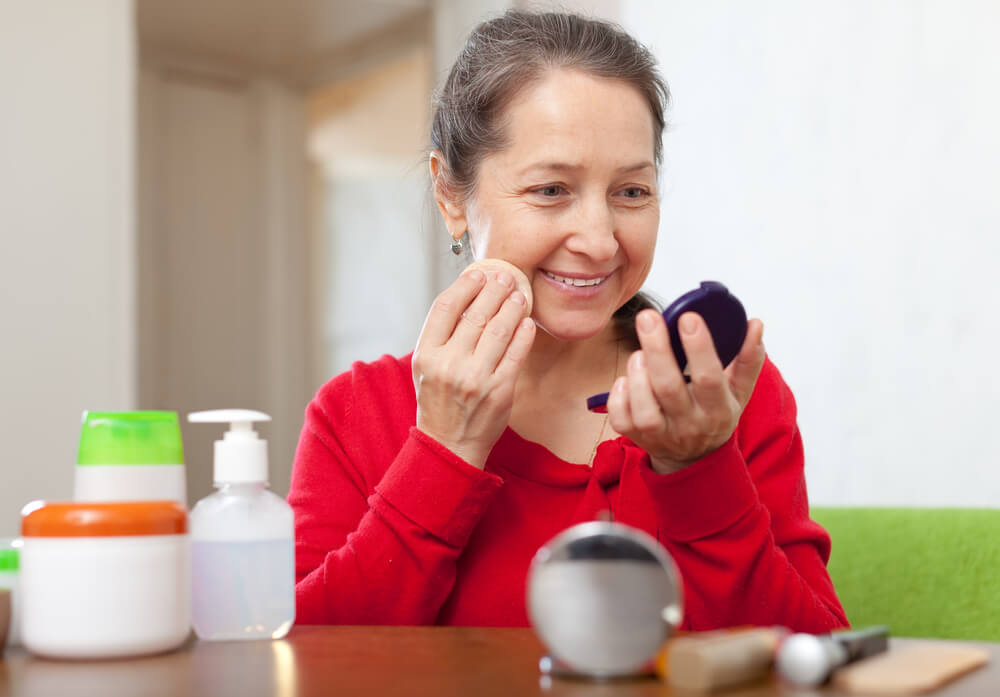
Why?
These products will only end up settling into any creases in your face as your skin moves, making any fine lines or wrinkles so much more visible.
Instead, go for a light liquid foundation, or a cream foundation.
Wondering what the main differences between the two are?
Well, a cream foundation is more opaque, meaning that it provides better coverage if you have age spots or broken capillaries. Using a cream foundation means that you will likely need to use less concealer on any of these blemishes.
Another bonus to using a cream foundation formula is that these will usually be more moisturizing, making them great for drier skin types.
On the other hand, a liquid foundation will tend to have a lighter texture, and, if you only have a few minor imperfections, a liquid foundation will likely do the job.
When it comes to actually applying your foundation…
Begin at the center of your face, and use a foundation brush to blend this outwards.
Wondering how to stop your foundation from settling into any lines or wrinkles?
This is often inevitable, no matter which foundation you choose. When this happens, all you need to do is blot the area with a Q-tip, before fixing it up with some powder.
Alternatively, if you are dealing with fine lines rather than deeper wrinkles, try pressing a finger gently against your skin, rocking it back and forth in a slight rolling motion. This will help to disperse the foundation that has settled into your lines.
Don’t like using foundation but still want a bit of coverage?
Try a CC cream instead. These are actually perfect for mature skin, because not only will they disguise any redness or imperfections, but they will also refine your skin’s texture.
Concealer
While some may strongly believe that a concealer should be applied before a foundation, it should really be the other way round.
Why?
Because your foundation will already cover up quite a few imperfections, so you will only need to use the concealer on areas that actually need the extra coverage.
Want to know the best way to use a concealer to hide blemishes?
Simply dab a small amount onto your blemish, and then use the tip of a brush to blend this into your foundation, until you cannot see it any more.
In addition to using your concealer to cover up any blemishes, you can also apply it in a way that will help to give your face more of a lifted appearance.
How?
Use your concealer to draw a triangle on your cheek, with the base of the triangle underneath your eye, and the other two sides pointing down towards your cheek. Then, blend it in.
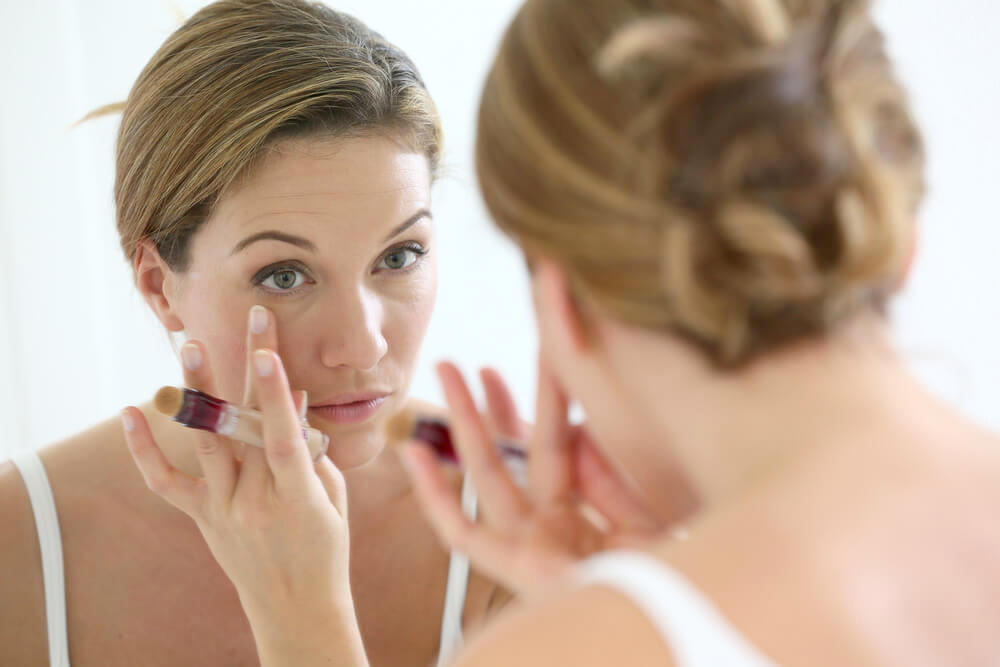
So, how do you actually go about choosing a concealer for mature skin?
Well, just like with your foundation, liquid or cream formulas are best. Liquid is usually preferred by those with mature skin, as its lightweight texture means that it is less likely to gather in wrinkles and creases during the day. If you opt for a cream, you may need to set it with a powder afterwards to ensure that it does not crease.
You will also likely need two different shades, one for underneath your eyes and one for your face.
Here are some tips on choosing the two shades:
- For underneath the eyes, choose a concealer that is one or two shades lighter than your natural skin tone. However, do not go any lighter than this, otherwise you may end up with an obvious light circle around your eyes
- For the face, your concealer needs to perfectly match the shade of your foundation
Blush
While a cream blush looks great on bare skin, a powder blush tends to be the better option if you are also wearing foundation. However, in order not to dry your skin out, you need to make sure that you opt for a powder that has a fine and light texture.
When it comes to color, do not be tempted by strong and harsh shades. As the face ages, it becomes more angular, and stronger shades of blush will only make this seem hollow.
Instead, go for a softer shade, such as apricot or rose, making sure that it complements your skin tone.
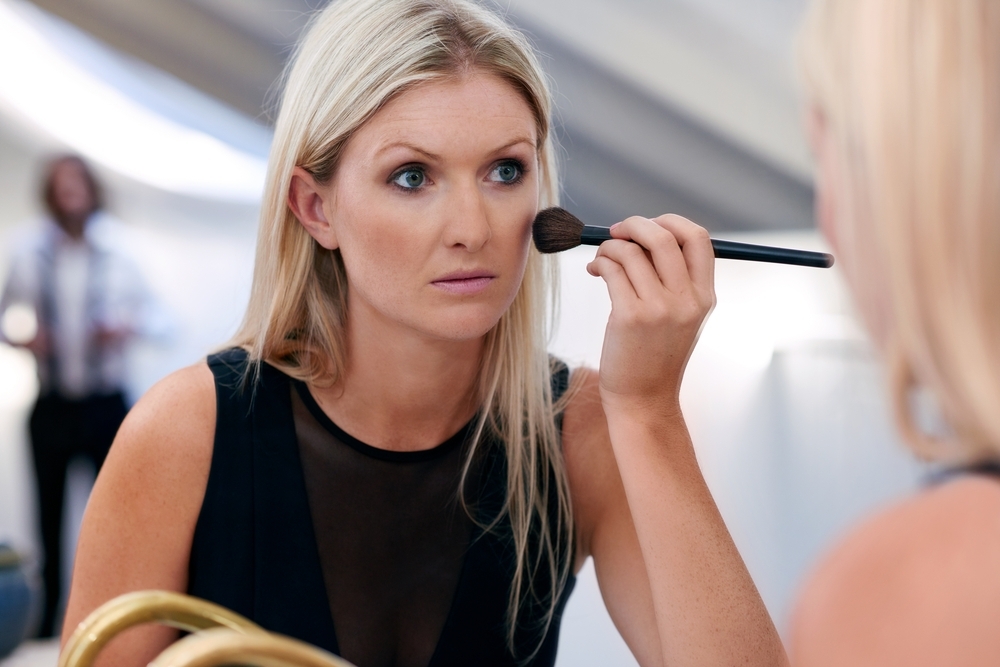
When it comes to actually applying your blush…
Many tend to apply this on the apples of their cheeks, but this often only ends up drawing attention to sagging skin.
What should you do instead?
Apply your blush to the highest point of your cheekbones, using a large brush to lift this upwards, making sure that you do not apply any color too close to your nose.
Eyes
Did you know that your eyes change shape as you age?
Your eyelids become more hooded, while wrinkles around the eyes can also affect their shape.
So, what is the best way to deal with this when it comes to eye makeup?
A subtle wash of a light colored shadow is really all you need, with satin finishes in particular helping to brighten up the eyes. Matte and sparkly shadows do not work too well on mature eyes, as these tend to settle into the fine lines on eyelids, making them looked creased.
If you do decide to go for a shadow with some sparkle or shimmer for a special occasion, keep this away from the outer corners of your eyes, as it will only emphasize fine lines. Instead, keep the sparkle for your inner corners, the center of your eyelids, and your brow bones.
What about eye liner?
This is great to make your eyes really pop, but a liquid or gel formula can sometimes be too harsh on mature eyes, making an eye liner pencil your best option.
Do you find an eye liner pencil difficult to apply?
This is a common issue, but an easy solution is to just make sure that your eye liner pencil is soft, so that the color comes out smoothly and easily.
When applying your eye liner…
Make sure that you apply more to your top lash line than your bottom.
Why?
Because this helps to prevent your eye liner from dragging your eyes down. Eyeliner on your lower lash line will also make your eyes look much smaller, and will draw attention to any dark circles. Try to also ensure that the line you draw becomes thicker towards the outer edge, because this will give you a lift in an area where mature eyes tend to droop.
Do not forget about your eyebrows either…
Eyebrows naturally thin with age, and filling these in can really subtract decades from your appearance. Use either a light colored brow pencil or a shadow, as you want the color to look subtle and natural. Make sure that you blend this in well, following your eyebrow’s natural shape and ensuring that they do not look as though they have been drawn on.
Just like with your eyebrows, your eyelashes will also naturally thin with age…
Mascara is great for this, but do not be afraid to experiment with individual false eyelashes, as these are perfect for filling in any gaps.
Giving your eyelashes a curl before applying your mascara can also make a huge difference, as this will instantly open up your eyes, making them appear bigger and brighter.
When applying mascara to mature eyes, you would be best off staying away from your lower lashes, and only applying it to your top lashes.
Why?
Because mascara on your lower lashes will only emphasize any dark circles or crow’s feet, whereas a deep, black mascara on your top lashes only will make your eyes look brighter and whiter.
Lips
Your lips will change quite a bit as you age, becoming much thinner, with wrinkles appearing around them.
This means that you will want to use makeup in a way that plumps your lips out, so that they appear fuller and smoother.
How can you do this?
With a sheer, moisturizing lipstick. Neutral shades are usually best, as you want to enhance the shape and color of your lips without drawing too much attention to them. The most flattering shades for mature lips tend to be a color that is only slightly darker than your natural lip color.
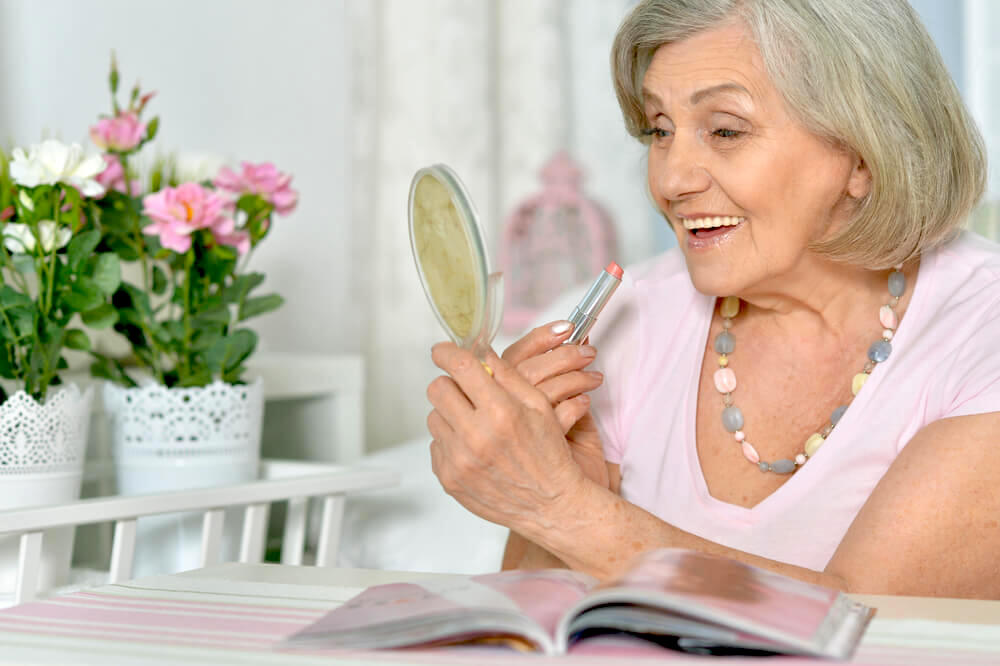
Try to avoid dark or bright lipsticks, as well as those with a satin finish.
Why?
Because these often only end up drawing attention to thinner lips, as well as to fine lines.
Don’t forget about lip liner either…
This can be used to give your lips a slight boost in volume, while also preventing your lipstick from bleeding into any wrinkles or lines. All you need to do is trace the lip liner around the outside of your lips, so that you have slightly over-lined them. However, make sure that the shade of lip liner you choose matches the shade of lipstick that you are going to be wearing with it, and try not to be too heavy-handed when applying the lip liner.
Wondering whether or not you should be wearing lip gloss?
The answer is no. While there is no denying that lip gloss can really help to plump up your lips, it will also highlight every single fine line that is on your lips, so is best avoided.
In order to really look your best as you age, your makeup needs to evolve in the same way that your face and features do. From your eyes to your lips, make sure that you are constantly assessing each individual feature, so that you can determine exactly what they need in order to really shine.



